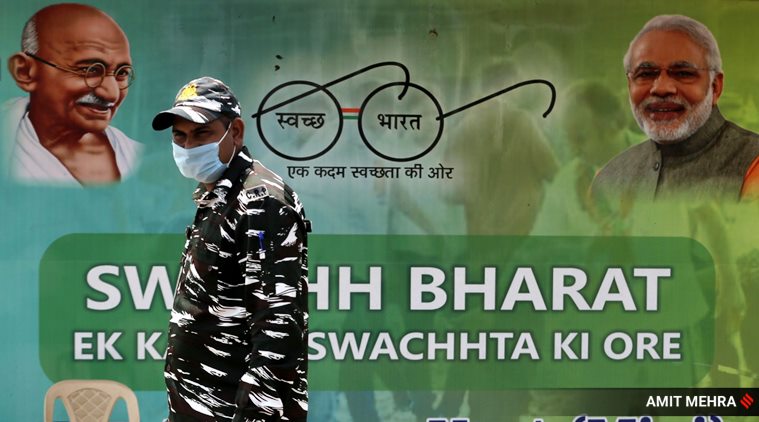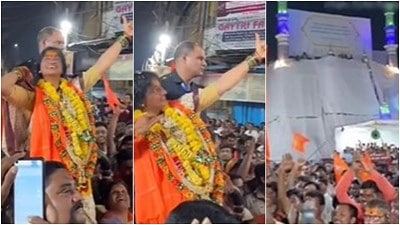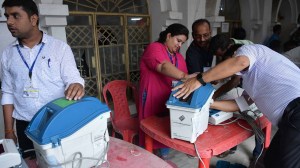- India
- International
The mask is the cultural icon of the pandemic
An unpredictable social stratification has come into existence following the pandemic. This, one can surmise, would continue for some time despite the empathy we show in our private spaces.
 An unpredictable social stratification has come into existence following the pandemic.
An unpredictable social stratification has come into existence following the pandemic.
The fourth phase of the lockdown ended on Sunday. But before we analyse its positives and negatives, we need to come to terms with a certain sense of fear associated with the COVID-19 virus even as we brace ourselves for a post-pandemic world.
Across the world, several thinkers and philosophers have been reflecting over the pandemic and its possible impact on life and society. The most important of them are Slavoj Zizek and Giorgio Agamben. In Zizek’s view, a new “sense of communism” would develop in the aftermath of the pandemic. Italian philosopher Agamben finds the pandemic to be another platform where sponsored homo sacers are created. His concern is more with the sad condition of the victims, when the state in all its dominant extravagance fails miserably. This unconditional question of “failure’’ is crucial in the Indian context as we come across the fear and angst the pandemic has created.
With relaxations increasing in the last stages of the lockdown, people have started thinking that movement is a possibility. But what kind of movement are we looking at? Faces covered by masks and hands in gloves, we queue up to buy things, condemn ourselves to follow social distancing and fail to recognise a fellow traveller — a migrant worker or domestic help.
An unpredictable social stratification has come into existence following the pandemic. This, one can surmise, would continue for some time despite the empathy we show in our private spaces. The vertical and diametrical divisions in the society are very acute to conceptualise and, even, to theorise. We have become our “Other”. Even within our homes.
Panic and distancing are two distinct themes of the COVID-19 pandemic. As the number of positive cases in the country crosses a lakh and half, our future rests on a precarious medical system. The routine flow of visitors from one state to another has added fuel to the fire. Panic is mainly produced by the news we hear, the footage we familiarise ourselves with, and the low-scale whisper network around. This panic is different from terror. This panic is the product of our utter helplessness.

Distancing is what we internalise and put to practice. With whatever little space available to us to do something, we maintain distancing. Now, universities and schools have to maintain adequate distancing of their students and teachers to conduct examinations or for conducting classes. Classrooms have become the “Other” for the academic. The gatekeeper will not smile at you, or even if he does, it is unlikely to register because he is masked. The mask is the cultural icon of the pandemic. And it registers your “Otherness”.
Extending Zizek’s claim that we may see a new communism, we are forced to comprehend several dualisms at stake. One such problem is in the realm of ethics. We are having several webinars on the post-COVID-19 world. But have we really given a thought to the alarming sense of suffering we have these days? Here I am reminded of Emmanuel Levinas’s observations on language and suffering. Levinas said: “The face speaks to me and thereby invites me to a relation incommensurate with a power exercised.” The question before us now is the invisibility of the faces.
The ailing cancer patient who cannot get admitted anywhere, the last ebb of the woman dying on the road due to dehydration, a migrant mother crying with her dead baby on her lap — these are all unbearable repositories of the lockdown. Suffering or enduring pain for the Other is an inescapable obligation. But the suffering I encounter in the faceless faces of the Other, points out the radical difference between the suffering of the Other and the suffering in me. This is where the ethics of the pandemic and lockdown is located. How to unburden this suffering is a question addressed to the state and its citizens.
Unni teaches English at Deshbandhu College, Delhi
40 Years Ago
EXPRESS OPINION
More Explained
Apr 18: Latest News
- 01
- 02
- 03
- 04
- 05









































